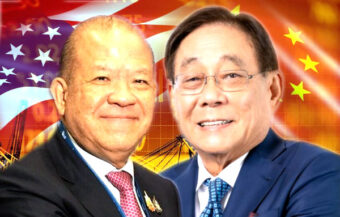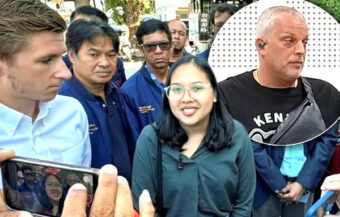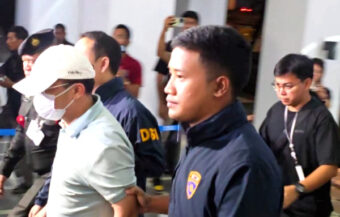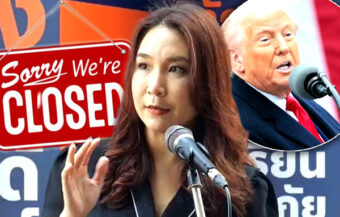Thai minister admits officials conspired with gangs, fueling foreign tourist distrust. Chinese abductions and Myanmar scams spark mass cancellations, 20% for Chinese New Year according to Thai Lion Air. Senate calls for stricter visas and tighter border checks as security concerns escalate.
A Senate hearing on Tuesday heard a cabinet minister admit that corrupt Thai officials may be linked to the crisis of confidence among foreign tourists. This comes following the abduction of Chinese tourists into Myanmar by scam centre gangs uncovered this month. These cases have fanned massive cancellations by foreign tourists, not just from China but from all international markets. This was confirmed on Tuesday by the President of the Thai Hotels Association (THA). Afterwards, leading members of the Senate called for a review of the visa waiver program between Thailand and China.
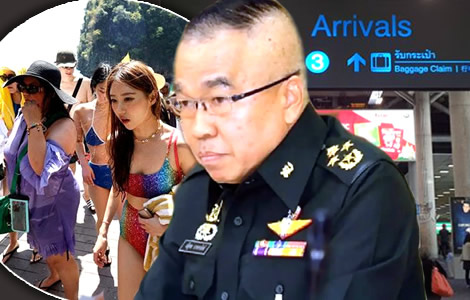
On Tuesday, a Thai cabinet minister told the Senate that Thai officials had collaborated with criminals. Certainly, he said this was an aspect of the heightened controversy of Chinese nationals being lured to Thailand and afterwards taken across the border.
At the end of last week, a Chinese police operation rescued several Chinese nationals being held in Myawaddy. This is home to a massive online scam empire run by a criminal warlord there.
Certainly, it appears that Chinese nationals were able to land daily at Suvarnabhumi Airport and were later taken into war-torn Myanmar at illegal border crossings near Mae Sot, in Tak province.
Tourism cancellations linked to security concerns damage Thailand’s industry ahead of Chinese New Year
These cases have caused widespread cancellations within the kingdom’s tourism industry. One airline, Lion Air, has estimated a cancellation rate of 20% for Chinese New Year.
The Senate additionally on Monday appeared to question the basis for the Thai-Chinese waiver programme. In truth, the relaxation of entry requirements, including no prior screening, has been at the root of the problem.
On Monday, even Tourism Authority of Thailand (TAT) Governor Thapanee Kiatphaibool appeared to suggest a review. However, Ms. Thapanee told reporters she opposed the cancellation of the visa waiver program.
At the same time, she indicated her support for a reduced stay period. Presently, this is 60 days with an optional 30-day extension. However, the latter period is at the discretion of the Immigration Bureau officer.
On Monday, the TAT boss suggested that a 15-day visa would be more desirable. The tourist chief indicated that the average Chinese visitor stayed for 7-10 days in the first place.
Senate highlights criminal exploitation of visa policy as a threat to border security and tourism
An upper house meeting on Monday heard Police Lieutenant General Wanchai Ekpornpichit raise his concerns about the visa policy. He and the criminal gangs had exploited the concession.
In short, they were using it to advance their goals, particularly the development of Thailand as a transnational crime hub.
“The visa-free policy has increased transnational crime, partly from Chinese criminals who use Thailand as a base,” Police Lieutenant General Wanchai told the Senate.
Ultimately, the upper house member called for the Immigration Bureau and police to tighten regulations. Notably, he pointed to crackdowns in Myanmar, Cambodia, and China.
In particular, the senator was concerned that these gangs appeared to be able to cross back and forth over Thailand’s borders with neighbouring countries. Basically, they seem to be subject to no immigration checks at all.
Calls grow for stricter visa regime for Chinese visitors to combat rising transnational crime concerns
In contrast, he suggested that a new Visa on Arrival regime should be introduced, especially for China. Consequently, arrivals at airports such as Suvarnabhumi would be asked to show hotel bookings and other evidence to support their stay.
Furthermore, he suggested a visa regime where hotel bookings and itineraries would be mandatory. Essentially, this would mean a reversion to the arrival regime from China that existed before the pandemic.
Deputy Ministry of Defence General Nattapol Nakpanit responded to this. Ultimately, he admitted that Thai officials were conspiring with criminal gangs. Undoubtedly, that was a key factor in this problem. General Nattapol is a former Secretary-general of the National Security Council.
“As the Ministry of Defence is responsible for border security, it has engaged in discussions with neighbouring countries through available mechanisms,” said the minister. “It has also tightened inspections of individuals crossing the borders, both through checkpoints and natural crossings.”
Thai Hotels Association reports cancellations surge amid heightened security concerns in tourism
The minister told the Senate that the relaxed visa conditions were an economically motivated decision by the government. He was responding to the security concerns of senators.
Meanwhile, the situation may be even graver than tourist cancellations from China. For instance, Thien Prasit Chaiphatranant, the President of the Thai Hotels Association (THA), told the Senate that it had recorded the cancellation of 12,428 room nights as a result of the security scare.
In brief, security confidence in Thailand has been damaged by the activities over the last few weeks. Particularly, the smuggling of Chinese tourists across the border and their concealment as scam centre silver workers.
Mr. Prasit, for instance, revealed that only 4,572 out of the room nights cancelled were by Chinese travellers. That was approximately 37%, while 63% of the cancellations were for other markets.
High-profile cancellations and blame game escalate fallout from ongoing security concerns in Thailand
Bangkok was the destination most affected, but so were Nonthaburi, Chiang Rai, Chonburi, and Chiang Mai, according to the hotel industry boss.
The cancellation, for instance, included a February 22 concert by Hong Kong singer Eason Chan, scheduled for the Impact Arena in Nonthaburi. It was cancelled due to fears for the safety of the singer.
Certainly, it is not known what consultations took place leading to that decision. A statement by the singer suggested an ‘internal discussion’ before it was announced. It said it was in the interest of ‘international visitors,’ while the news was later carried on the Chinese Communist Party news outlet the Global Times.
Undoubtedly, this move added substance to reports circulating online in China and indeed across the world.
In the meantime, at Monday’s hearing, attempts were made by some speakers to blame fake news for the debacle. One speaker took issue with claims that the tourist cancellation rate was 30% when according to officials, it was closer to 10%.
Tourism Police counter allegations with data as media coverage sparks concerns over safety in Thailand
A senior officer with the Tourism Police, Deputy Commander Krit Warit, addressed the parliamentary hearing. Significantly, he pointed out that the Chinese victims in the last few weeks all entered and subsequently exited Thailand.
The senior officer said these highlighted cases were not cases where Chinese tourists had been targeted in Thailand. However, they did appear to be transported across the border by others.
Nonetheless, there have certainly been murders, rapes, and kidnappings of Chinese tourists reported extensively, particularly since the country reopened after the pandemic.
Unfortunately, these cases have fed into the online social media coverage in China. In short, this viral coverage in China has been particularly damaging for Thailand.
Notably, this messaging chimes with Beijing’s policy of encouraging Chinese visitors to stay at home.
At the same time, the experimental visa waiver reintroduced in 2024 has seen a rapid rise in Thai tourists visiting China. Undeniably, this is a loss to the Thai economy.
National Police Chief orders tighter security for foreign tourists and increased border surveillance
In the meantime, National Police Chief General Kittirat Phanphet held a video conference meeting with senior officers on Monday. The police chief wanted to see tighter security for foreign tourists.
PM Paetongtarn to speak Chinese with AI to address security fears in China as foreign tourism suffers over scam farms
In particular, a tightening of controls in the Mae Sot area of Tak Province. This is where many of the Chinese tourists passed through since December 2024 on their journey to Myawaddy.
General Kittirat called for heightened surveillance of the border crossing precincts.
Join the Thai News forum, follow Thai Examiner on Facebook here
Receive all our stories as they come out on Telegram here
Follow Thai Examiner here
Further reading:
Visa waiver scheme questioned with another China Crisis for foreign tourism driven by security fears
Tourism cryptocurrency sandbox payment plan is bound to face stiff opposition from the central bank
Thaksin calls for crypto-based bonds. Notes success and beauty of Isan women who marry foreigners
Future Bank of Thailand Chairman Pick warns that the Thai economy faces ‘disaster’ without rate cuts
Trump’s trifecta triumph means Thailand will be more on edge as he prepares to take power in January

